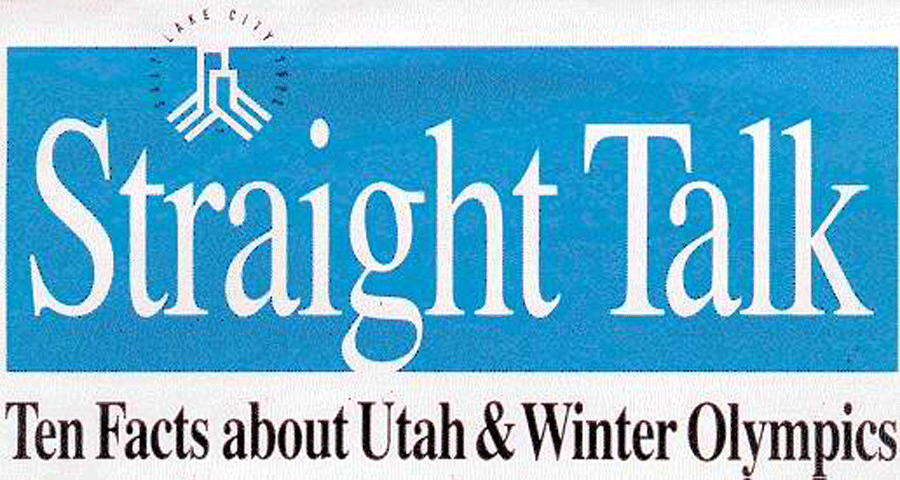This year marks the 20th anniversary of the 2002 Salt Lake City Olympics, much of which was held in Park City. This is the first article in a series covering that story.
When the 1980 “Miracle on Ice” USA Olympic hockey team lit the torch to open the 2002 Salt Lake City Winter Olympic games, it marked the end of a long, controversial road to bring the crowning event of winter sports to Utah. The games of twenty years ago turned out to be among the most successful Winter Games ever, turning a profit and continuing a legacy of world class winter sports events in Utah. More than half of the medal events for 2002 took place in or near Park City, putting a spotlight on the Wasatch Back that has never dimmed.
In 1965 the newly elected governor of Utah, Calvin Rampton, gathered some old friends at the Governor’s Mansion for a visit. “There were four of us in the room,” Rampton recalled years later at a University of Utah Ski Archives banquet honoring those gathered that night. “It was myself, Max Rich (the president of the Salt Lake Chamber of Commerce), Jack Gallivan (the publisher of the Salt Lake Tribune), and – he joked with a chuckle – “Jack Daniels.”
Together they cooked up a scheme to promote Utah’s fledgling winter ski industry. Park City was only in its third year of operation, and Snowbird and Deer Valley did not yet exist. The plan was to bid for the 1972 Winter Olympics. The whole bid cost $35,000, all paid for by selling 35,000 Olympic bid pins at a dollar each. The Utah boosters had no intention of winning—they knew Salt Lake City couldn’t afford to stage the games—but bid for the sake of getting free publicity. In Rome, at the meeting of the International Olympic Committee, the bid did get some favorable attention, which scared Rampton. He turned to Max Rich and said “Good God Max—what if we win?” Fortunately, Sapporo, Japan won the 1972 games, and Rampton said with a grin, “They lost millions!”
In 1972 Denver had already secured the 1976 Winter Games, but a voter referendum turned the games down and the International Olympic Committee had to scramble for a new host city. Again, Salt Lake City offered itself, but the IOC was in no mood to reward another American city after the Denver snub, and returned the games to 1964 host city Innsbruck, Austria. Again, Utah would not have been ready, but now the idea was catching serious interest.
A new generation of winter sport boosters took up the cause again, this time seriously bidding for the 1998 games. But the 1996 Summer Olympics were awarded to Atlanta, and the chances of back-to-back American based Olympics seemed like a long shot. Still, when the IOC delegates voted, Salt Lake’s by now sophisticated bid came up only four votes short to Nagano, Japan.

Credit: Park City Historical Society & Museum, Sally Elliott Collection
The next shot was 2002, and the bid resumed in earnest, this time playing by IOC “expectations.” It turned out later that Nagano was very free with gifts and perks for IOC members, with gifting, luxury travel, and other considerations amounting to millions of dollars. How many millions no one knows, as Nagano bid officials conveniently burned all their records in the city incinerator prior to 1998. Later investigations proved that other bid cities also spent wildly to win IOC votes. This time Salt Lake bidders decided to hold their noses and surrender to some IOC member’s expectations. They lavished at least a million dollars on everything from luxury travel to free medical procedures to shopping sprees and college scholarships for IOC members and their families. Salt Lake’s technically superior bid should have won anyway, but it, combined with the bribes, assured its victory in IOC voting.
But when the bribery scandal broke wide open in 1998, Utah’s reputation crashed in what became an international debacle. Investigations led to the expulsion of ten IOC members, with ten more sanctioned. The imperious IOC President, Juan Antonio Samaranch, himself a frequent recipient of lavish travel and gifts from bid cities, was forced to apologize to Salt Lake bid organizers for the demands of its bribery prone members.
Still, the Salt Lake Olympics’ reputation was shattered. Sponsors and would be sponsors abandoned ship. The bid leaders, Tom Welch and Dave Johnson resigned and were charged with conspiracy to commit bribery in federal court, where they were acquitted. Mitt Romney was recruited from Massachusetts to restore integrity and financial stability to the games.
The games would go on, and it was up to the new Olympic leaders to stage games so flawless, spectacular and inspiring to erase the bad impressions left worldwide by the scandal. They had their chance twenty years ago this week. How they did is the subject of next week’s story.
Larry Warren covered the bidding for, and staging of, the Winter Olympics from the 1980’s through 2002 for KUTV in Salt Lake City.